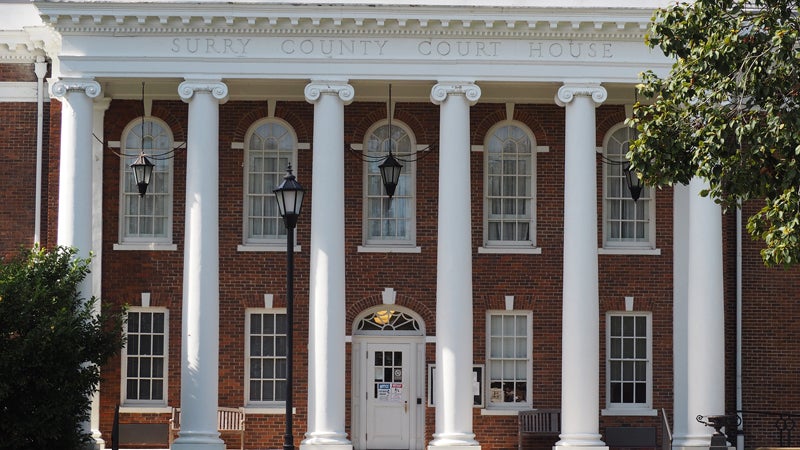June 1 ruling expected in Surry biogas case
Published 4:30 pm Friday, April 28, 2023

- (Aug. 17, 2020 file photo of Surry County Circuit Courthouse by Stephen Faleski | The Smithfield Times)
A judge expects to rule by June 1 on former Surry County Supervisor Michael Drewry’s petition to reverse the county’s 2022 approval of a controversial natural gas project.
Align RNG, a joint venture of Dominion Energy and Smithfield Foods, received the supervisors’ 2-1 approval last June to construct a regional processing facility at the Surry-Sussex county line that would turn methane from hog manure, also known as biogas, into pipeline-quality natural gas. The facility would serve as a hub for participating Smithfield Foods farms in Sussex, Surry, Isle of Wight and Southampton counties.
Drewry, who cast the dissenting vote, resigned from the Board of Supervisors’ Dendron District seat on July 11, one week after filing a complaint that asked the court to declare the board’s vote “null and void” on grounds that the county Planning Commission allegedly didn’t follow procedures required under state law when vetting the project in 2021.
Retired Judge James Hawks, who inherited the case after Circuit Court Judge Carson Saunders Jr. recused himself last fall, heard arguments from Drewry, County Attorney Lola Perkins and Align attorney Dabney Carr on April 28.
Drewry’s complaint contends Surry neglected to provide the written notice required by state law to all owners of abutting properties, including four in neighboring Sussex County, ahead of the Planning Commission’s Sept. 27, 2021, public hearing on Align’s requested permit. Drewry further contends the planners neglected to issue a finding of Align’s project being “substantially in accord” with the county’s comprehensive plan, which had designated the 22.8-acre site as “rural preservation,” ahead of voting on Nov. 21, 2021, to recommend the project’s approval to the supervisors.
Drewry argued at the hearing that his actions aren’t without precedent. In 2010, he and a group of Surry residents sued the Dendron Town Council over its approval of a proposed coal-fired power plant. According to past reporting by The Smithfield Times, a Surry judge ruled the rezoning invalid in 2011, finding in favor of Drewry’s claims that the town had failed to give proper notice ahead of the vote.
Drewry’s complaint cites a state law that mandates a local planning commission, at least five days before a scheduled hearing concerning a “change in the zoning map,” provide written notice to each owner of “all abutting property” by registered or certified mail.
The supervisors, he argued, should have remanded Align’s application back to the Planning Commission for a new public hearing, this time with notices sent to all adjacent property owners. Written notice is “sacred to Virginia law, Drewry said.
Carr, however, argued the county’s zoning map hasn’t actually changed, since Align applied for – and was granted – a conditional use permit, rather than a rezoning. The land remains zoned A-R, or agricultural-rural.
Carr then described Drewry as trying to act as a “private attorney general” by asserting the rights of people other than himself. Carr argued that since Drewry attended the Sept. 27, 2021, Planning Commission hearing, he could not claim unawareness of the proceeding, and had no standing to bring a court action on behalf of Sussex County residents.
Perkins argued that in addition to the scheduled Planning Commission’s and supervisors’ public hearings, Align had hosted several community input meetings where residents could weigh in with any concerns, making the “totality of notices” sufficient.
Drewry contends in his complaint that the project, if allowed to proceed, will result in air and noise pollution, though Carr contends the facility’s carbon dioxide and methane emissions will be “minimal” and “non-toxic.”
Methane, if emitted into the atmosphere, acts as a potent greenhouse gas, but can be captured, according to Align officials, using an anaerobic digester and covered lagoons. From there, it would travel through a 65-mile pipeline network that would cross the Blackwater River and two swamps before ending up at the Surry site, where the collected gas would pass through membranes to remove hydrogen sulfide and carbon dioxide, leaving 99% pure natural gas.
Align contends the reduction in greenhouse gas emissions from participating farms will be roughly equivalent to taking 22,000 vehicles off the road, even with the facility re-releasing an estimated 12 tons of extracted carbon dioxide annually. Company officials have also acknowledged that not all the extracted hydrogen sulfide will be turned into solid sulfur and hauled away. The amount that escapes the membranes will be fed into a thermal oxidizer – essentially an incinerator – where intense heat will transform the gas into less-harmful sulfur dioxide. Align, as of last year, estimated around 8 tons of sulfur dioxide would be emitted from the Surry site per year.
Drewry, when casting his dissenting June 2 vote and again at the April 28 hearing, cited a lawsuit Align had settled with a North Carolina-based environmental group, Clean Air NC, in 2021 concerning alleged violations of that state’s air quality regulations at a similar processing facility at the border of Duplin and Sampson counties.
Dominion spokesman Aaron Ruby told the Times last year that even though Align’s Surry site will serve 20 farms, compared to the 19 served by the North Carolina facility, the Surry site will produce less than two-thirds of the amount of biogas as the North Carolina project, and will use different technology aimed at generating fewer emissions.




